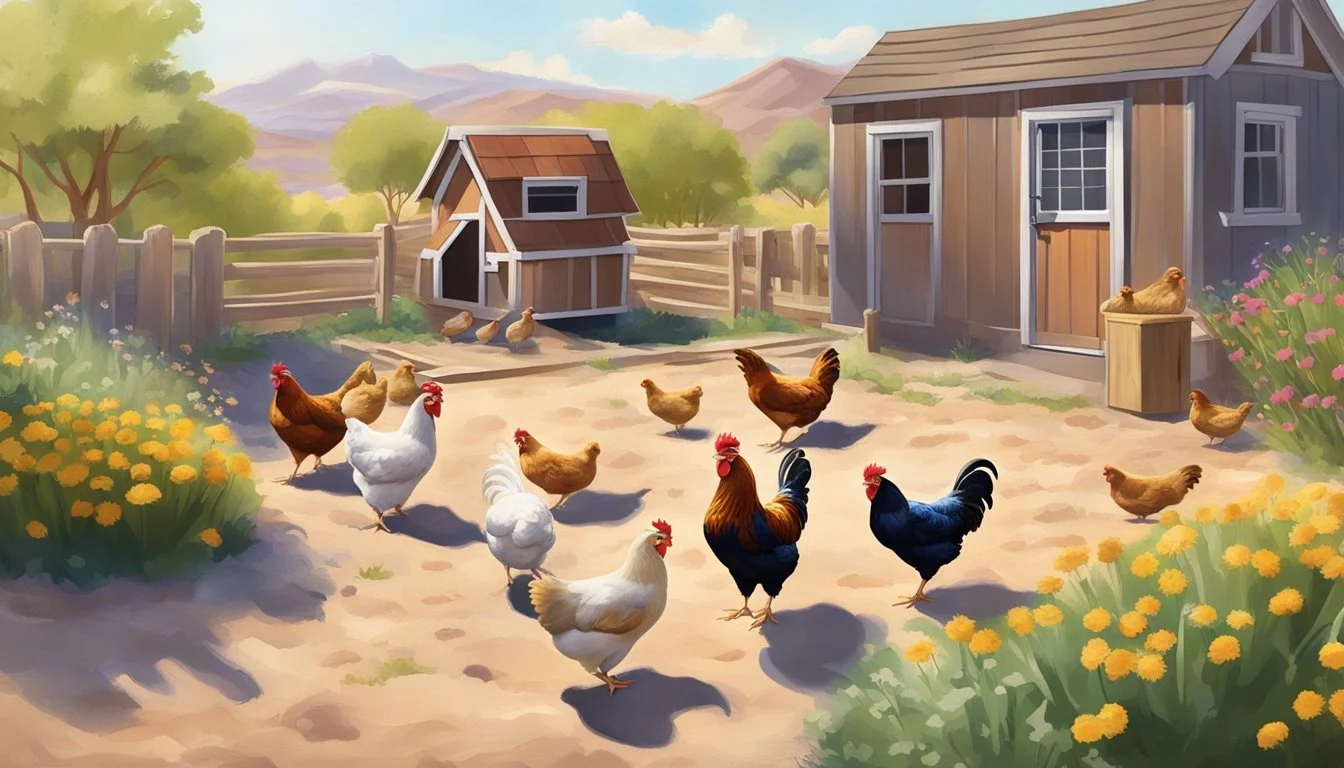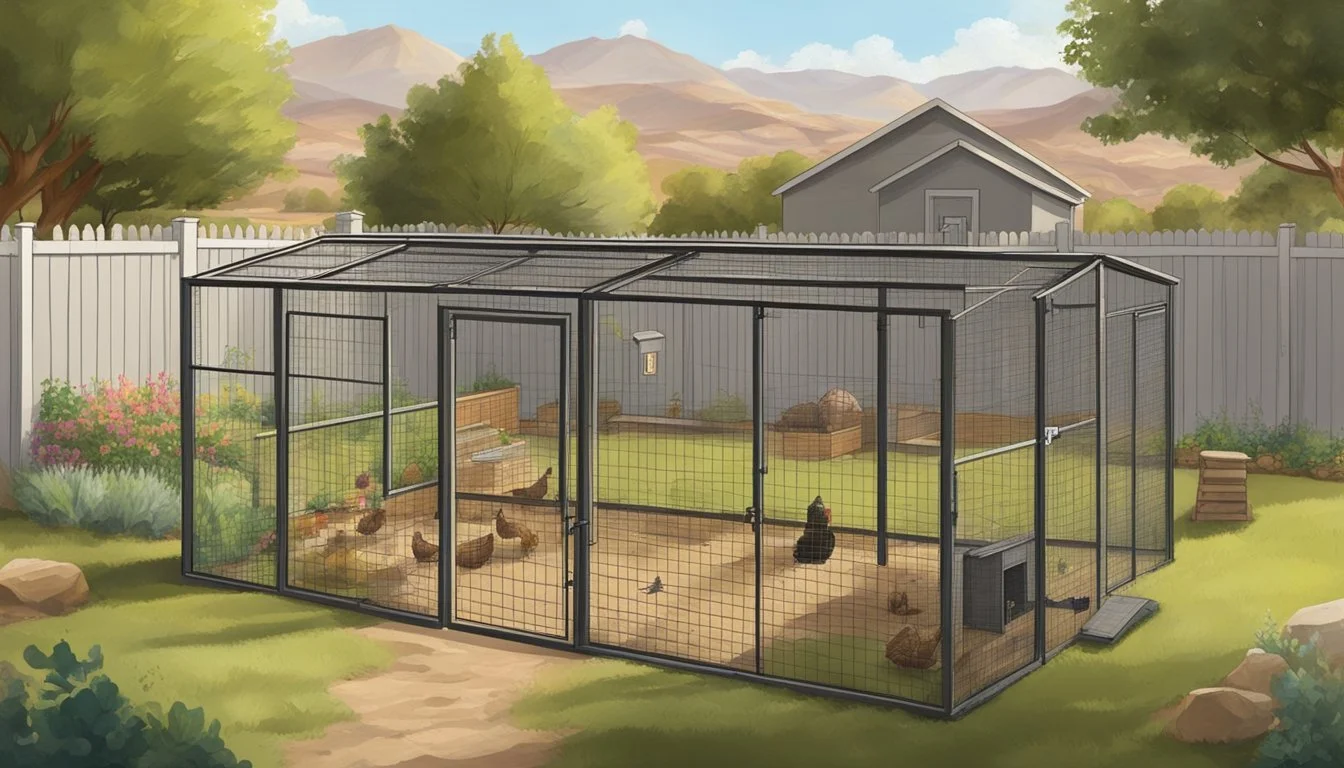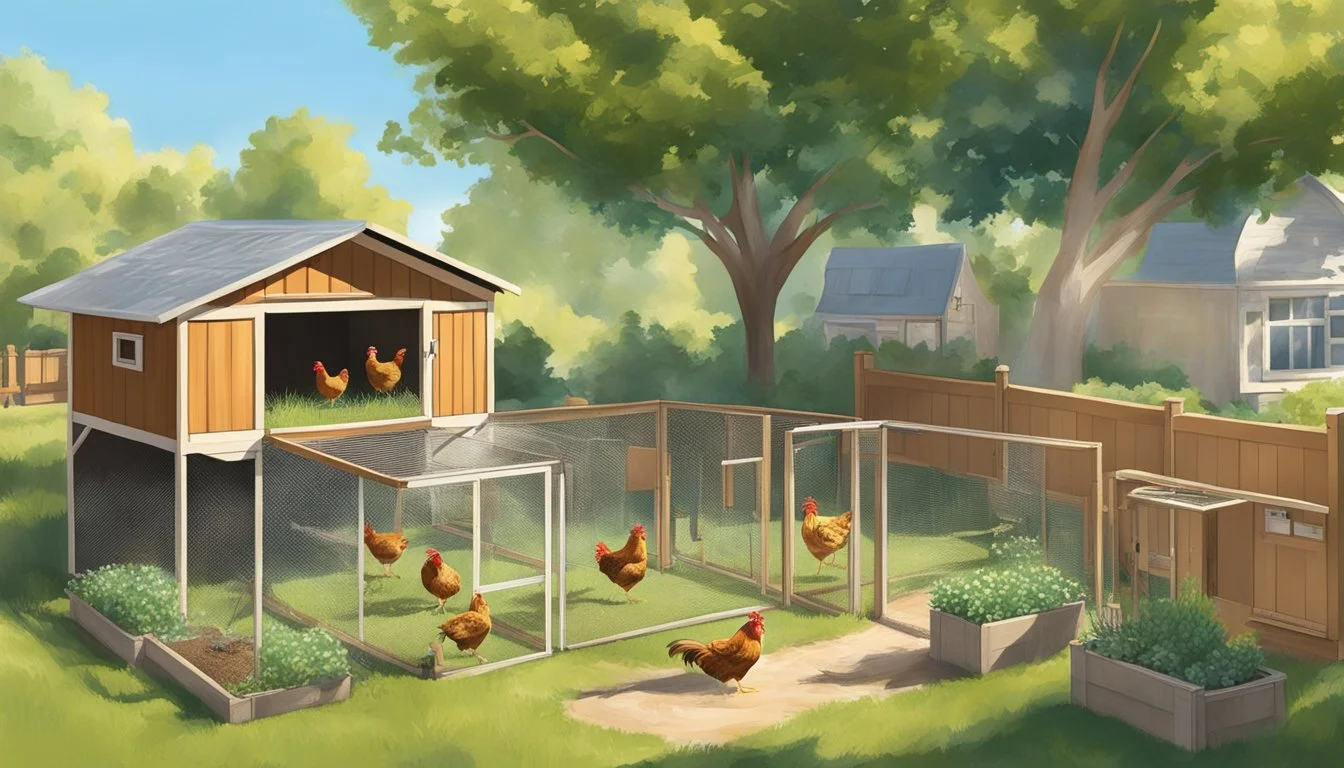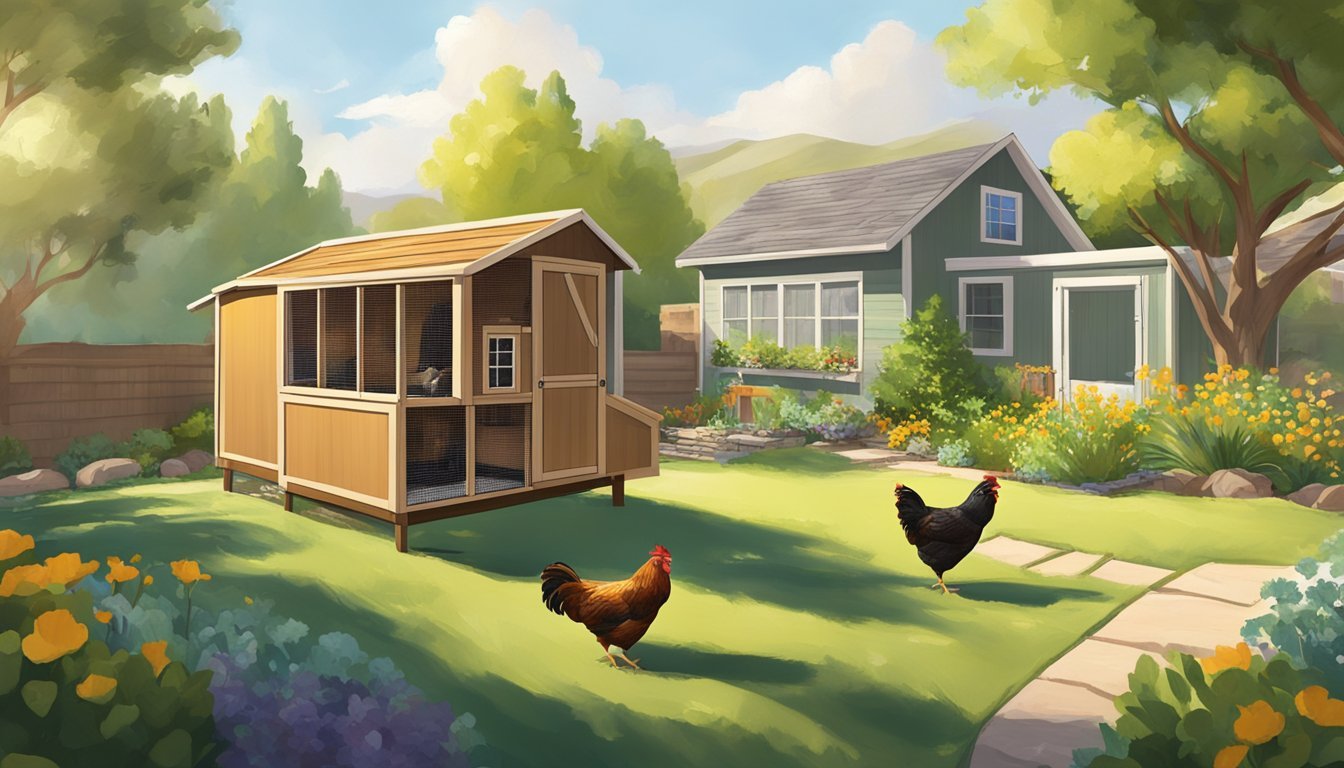Keeping Backyard Chickens in St. George, UT
Essential Guidelines for Urban Poultry Farming
Raising backyard chickens has become a popular endeavor in St. George, Utah, as residents seek to embrace more sustainable living practices and enjoy the benefits of fresh eggs. The city acknowledges the growing interest in urban agriculture and permits the keeping of chickens within residential zones. This aligns with a nationwide trend as more individuals and families look for ways to connect with their food sources and take more control over their dietary intake.
In St. George, the specifics of how many chickens a resident may keep are not explicitly detailed in the city code. For precise guidelines, prospective poultry keepers are advised to contact city officials for the most current rules and any required approvals. Chicken ownership in St. George is subject to zoning laws designed to ensure that the practice serves the community positively without causing nuisances or health issues.
The city's zoning definitions classify the tilling of soil, raising of crops, horticulture, and gardening as agricultural practices. However, they require residents to take the necessary precautions to maintain sanitary conditions, which includes rodent-proofing coops and making sure that food attractants are properly stored to not invite vermin. Understanding and complying with these rules is essential for any St. George resident considering the addition of a chicken coop to their backyard.
Getting Started
Before embarking on poultry farming in St. George, Utah, prospective chicken keepers should familiarize themselves with relevant city ordinances. It is paramount to ensure compliance with local laws to avoid legal issues and maintain good relations with neighbors.
Local Ordinances: St. George residents with a lot size of 6,000 square feet may commence with six chickens. For every extra 1,000 square feet of lot space, they are permitted an additional chicken, not exceeding a total of 16.
Residential Zoning: Chicken keeping is allowed within various residential zones. Interested parties should contact city officials for zone-specific regulations.
Lot Size and Dwelling Requirements:
Minimum Lot Size: 6,000 sq ft for initial 6 chickens.
Additional Space: 1,000 sq ft per added chicken.
Maximum Chickens Allowed: 16.
Homeowners' associations (HOA) might have separate rules governing the keeping of chickens. It's advised that residents consult their HOA to confirm any additional restrictions or requirements.
Important Contacts: Residents should reach out to the City of St. George for precise details on urban chicken farming and to obtain any necessary approvals.
For novices in chicken rearing, starting small, with a manageable flock size, allows for learning and adjustment to the responsibilities of poultry care under urban conditions. Observing community standards and showing consideration for neighbors will help integrate this sustainable practice smoothly into suburban life.
Understanding Local Regulations
In St. George, UT, it is important for individuals considering backyard chickens to be aware of and comply with relevant regulations. These include city and county ordinances, Homeowners Association (HOA) restrictions, and statewide regulations.
City and County Ordinances
The City of St. George permits residents to keep chickens in residential zones. The exact number of chickens allowed may not be explicit in the city code, therefore residents should contact city officials to ensure their coop meets the legal requirements and obtain specific approvals. Regulations ensure that all chicken coops are maintained properly to avoid public health issues or nuisances.
Key Elements of St. George City Ordinances:
Zone Permissibility: Chickens are permitted in residential zones.
Number of Chickens: Specific numbers should be confirmed with city officials.
Maintenance: Coops must be kept clean and orderly.
Violations of these ordinances may lead to fines or other penalties.
HOA Restrictions
Residents living in communities governed by an HOA should review their association's covenants, conditions, and restrictions (CC&Rs). These documents may have rules that further restrict or prohibit the keeping of backyard chickens, sometimes being more stringent than city ordinances.
Critical Considerations for HOA Restrictions:
CC&Rs Compliance: Check your HOA's rules regarding poultry.
Approval Process: Seek HOA approval if required, as some may require a formal request.
Utah Statewide Regulations
Statewide, rules for keeping chickens in backyards may vary. It is suggested that residents consult the Utah State University Extension for guidance on best practices in raising backyard chickens and ensuring that they are in line with broader Utah regulations.
Essentials for State Compliance:
Guidance Resource: Utah State University Extension provides crucial information on poultry management.
Best Practices: Following these may help in aligning with state regulations and local control measures.
Understanding and adhering to these directives is essential for a compliant and harmonious backyard chicken-keeping experience in St. George, UT.
Setting Up the Coop
When setting up a chicken coop in St. George, Utah, one must pay close attention to location, design, and predator protection to ensure the health and safety of the chickens.
Choosing the Right Location
The ideal location for a chicken coop is on a well-drained area to avoid flooding, with ample sunlight exposure to prevent mold and parasites. It should be at least 50 feet from any dwelling and 20 feet from the property line, adhering to St. George's local ordinances. If borders are close, installing a solid wall may be necessary.
Coop Design and Size
To accommodate the local climate and building requirements in St. George, an enclosure should provide ample ventilation and shade. In terms of size, allow for 2-3 square feet per chicken inside the coop and about 8-10 square feet per chicken in the outdoor run. Use durable materials to protect against weather fluctuations.
Protecting from Predators
Chicken coops must be secured against common Utah predators like raccoons and birds of prey. This includes sturdy wire mesh on windows and an apron of hardware cloth buried at least 12 inches deep around the perimeter to deter digging predators. A secure, lockable door is essential to protect the flock.
Chicken Care Essentials
Keeping backyard chickens in St. George, Utah entails giving them a nutritious diet, regular access to fresh water, and ensuring their health by monitoring for any signs of illness.
Feeding
Chickens require a balanced diet to remain healthy and productive. They should be fed a commercially-prepared chicken feed that meets their nutritional needs which typically includes a mix of grains, proteins, and essential vitamins and minerals. It is essential to store feed in a cool, dry place to prevent spoilage.
Chicks' feed requirements: Starter feed with 18-20% protein
Adult chickens' feed requirements: Layer feed with 16% protein
Treats: Occasional fresh vegetables or fruits
Watering
Chickens need a continuous supply of clean, fresh water. Waterers should be cleaned regularly to prevent the buildup of algae and bacteria. In freezing conditions, it's crucial to ensure that the water does not ice over.
Waterers: Clean daily
Water temperature: Unfrozen, cool
Backup water supply: Bottled water in case of contamination
Healthcare
Regular check-ups with a veterinarian are advisable to keep chickens in good health. Watch for signs of distress, injury, or illness and separate sick birds from the flock to prevent the spread of disease.
Common signs of illness:
Lethargy
Abnormal droppings
Respiratory distress
Preventative care: Regular deworming, vaccinations as recommended by a veterinarian
Managing Your Flock
In St. George, UT, managing a backyard chicken flock requires attention to daily tasks, mitigating any potential disturbances like noise and odor, and controlling the population through selective breeding. Adhering to local ordinances and maintaining good neighbor relations is paramount.
Daily Maintenance
For daily care, chicken keepers must provide fresh water and food, and the coop must be cleaned regularly to prevent disease. They should inspect chickens for signs of illness or distress. Feeding routines and egg collection should occur consistently to maintain the flock's health and productivity.
Checklist for Daily Tasks:
Refresh water and food supplies.
Clean droppings and leftover feed to maintain sanitation.
Collect eggs to prevent breakage and ensure freshness.
Observe each chicken to catch health issues early.
Dealing with Noise and Odor
To be a good neighbor, one must manage noise and odor effectively. Roosters are known for crowing, which can be disruptive; thus, many urban areas restrict their ownership. Regular coop cleaning will control odors and minimize attraction of pests or wild animals.
Strategies for Noise and Odor Control:
Maintain a clean coop environment.
Consider rehoming roosters or employing no-crow collars if noise is an issue.
Place the coop away from neighbor’s property to reduce impact.
Breeding and Population Control
To prevent overpopulation, breeding should be intentional and managed carefully. If roosters are present, fertilized eggs are a possibility, making incubation and chick care additional considerations. Urban chicken keepers should understand their capacity limits to avoid overwhelming their space and resources.
Population Management Tips:
Limit the number of chickens and roosters to comply with local ordinances.
Implement an egg incubation plan if intending to breed.
Use fencing or enclosures to control the flock's roaming area.
Community and Legal Considerations
When keeping backyard chickens in St. George, UT, residents must consider community dynamics and local laws. This includes understanding the specific regulations set by the city and maintaining a harmonious relationship with neighbors.
Being a Good Neighbor
Raising chickens can have an impact on the surrounding community. To maintain positive relations, residents should:
Ensure that chicken coops and ranges are kept clean to prevent odors and pests.
Be considerate of noise levels, since chickens, particularly roosters, can be loud.
Engage with neighbors to address concerns proactively and amicably.
Navigating Legal Disputes
Disputes related to backyard chickens often arise from misunderstandings of city and county ordinances or from disregarded community standards. To navigate these disputes:
Familiarize oneself with city/county ordinances. In St. George, homeowners are allowed up to 6 chickens on a 6,000 sq ft lot, with an additional chicken per 1,000 sq ft, not exceeding 16 birds.
Be aware that cities in Southern Utah, such as Orem, Provo, Sandy, West Jordan, and Ogden, each have their own specific regulations which may differ from St. George’s rules.
Consult with homeowner associations to ensure compliance with their regulations, which can be among the top association issues.
Health and Safety
When raising backyard chickens in St. George, UT, owners must prioritize health and safety to prevent disease and prepare for emergencies. Maintaining biosecurity measures and adhering to regulations can safeguard both human and poultry health.
Disease Prevention
The cornerstone of disease prevention lies in robust biosecurity practices. Owners should implement measures to minimize the risk of pathogen transmission. Regularly cleaning coops and ensuring that wild birds cannot access the feed prevents the spreading of diseases such as Salmonella. Participation in the National Poultry Improvement Plan (NPIP) supports the monitoring and certification of poultry health, enhancing disease management efforts.
To mitigate the risk of egg-transmitted diseases, proper sanitation and handling of eggs are crucial. It is essential to collect eggs frequently and store them at the right body temperature to prevent bacteria growth. A good practice is to clean the eggs with fine sandpaper, a brush, or a cloth, ensuring that one does not use cold water which may cause egg contents to contract and potentially draw bacteria into the egg.
Emergency Preparedness
Emergency preparedness entails having protocols for extreme weather, sudden illness, or predator attacks. Ensure chickens have access to a proper heat source to maintain their body temperature, especially during St. George's cooler months. Coops should be constructed to withstand various weather conditions and prevent predator intrusions.
In case of illness, having a plan for isolation of affected birds is essential for controlling the spread of disease. Owners must be ready to adapt to the needs of their flock, whether it requires adjusting warmth sources during a cold spell or implementing quarantine measures in the event of a contagious disease outbreak.
Advanced Topics
In St. George, UT, backyard chicken enthusiasts who are ready to take their poultry-keeping to the next level may consider breeder flocks and entering into commercial partnerships. This section delves deeper into the sophisticated areas of poultry agriculture.
Breeder Flocks and Genetics
Breeder flocks take backyard chicken keeping into the realm of careful selection and breeding for desired traits. Poultry specialists might emphasize the importance of understanding genetics to maintain a healthy and vigorous flock. David Frame, a poultry specialist with the USU Extension, offers expertise in the development of breeder flocks and the selection process which ensures the vitality and productivity of backyard poultry.
Genetic Diversity: Essential for robust flocks
Selection for Traits: Egg production, temperament, disease resistance
Commercial Partnerships
Experienced poultry keepers might explore partnerships with commercial wholesalers or local businesses. This requires a knowledge of agricultural business practices and strong networking skills.
Local Businesses: Restaurants, farmer's markets, and grocery stores as potential partners
Regulations and Contracts: Understanding local ordinances and drafting agreements
Poultry enthusiasts should engage with USU Extension for guidance on advanced poultry care and making commercial connections.
Considerations for the Future
In planning for the future of backyard chicken farming in St. George, UT, residents must consider adopting sustainable practices and creating educational opportunities. These considerations will ensure that chicken farming remains viable and beneficial for the community.
Sustainable Practices
Sustainability in backyard farming hinges on two critical factors: resource management and environmental impact. Prospective and current chicken owners should focus on:
Waste Management: Proper disposal and composting of chicken waste to minimize odor and reduce the risk of attracting pests.
Water Conservation: Implementing systems to reduce water use, such as rainwater harvesting for chicken coops.
Educational Opportunities
Education plays a vital role in the successful management and growth of backyard chicken farming. It contributes to the following:
Farming Education: Providing workshops on best practices in chicken care, coop maintenance, and sustainable farming.
Community Engagement: Schools and community centers can integrate poultry farming into their programs, fostering a sense of responsibility and knowledge about local food sources.











